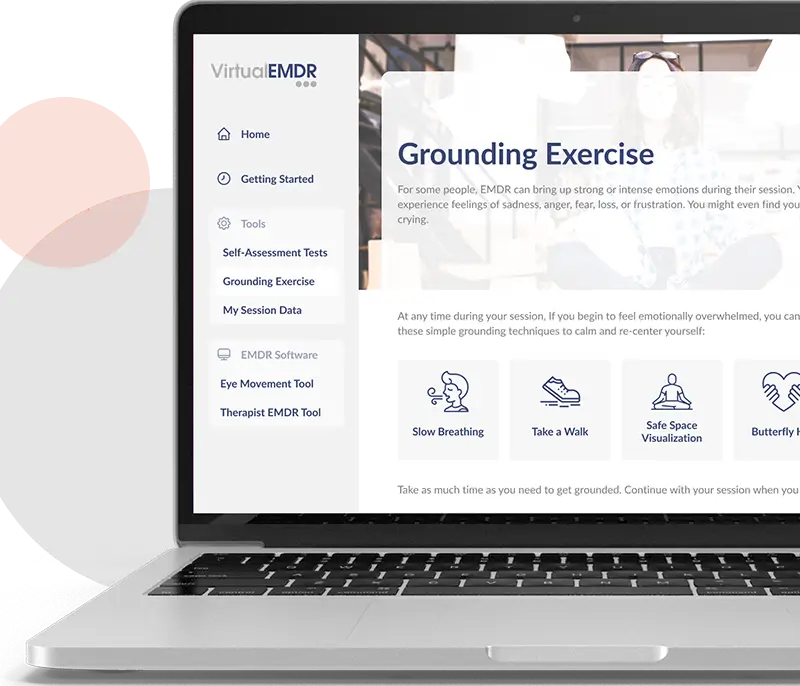What Is Grief?
Grief is a natural response to loss, and it can involve a variety of emotions, such as sadness, anger, guilt, and confusion.
While experiencing grief after a loss is normal, 1-in-10 of bereaved
survivors
suffer
from Prolonged Grief, where you feel unable to adjust to
normal
life.
Some people may find that the grieving process is complicated by distressing
memories,
unresolved issues, or intense emotional reactions related to
the loss.
EMDR therapy can be used to help individuals effectively process their grief and facilitate adaptive coping.
Symptoms of Grief Include:
Trouble concentrating, making decisions, or with memory
Profound sense of isolation, even when surrounded by others
Haunted by sadness, guilt, or thoughts of what might have been
Believing life will never be normal or you can feel happy again
Grief can have a significant impact on your daily life, relationships, career, and overall
well-being.
Luckily, effective treatment can help you manage
and overcome your pain.
How Does Virtual EMDR
Work on Grief?

Data from 10,000 Virtual EMDR Sessions
In numerous studies, EMDR has been scientifically proven to effectively treat Grief. While EMDR was originally developed to treat trauma-related conditions, its application has expanded to include a broader range of experiences that contribute to emotional distress, including grief.
Unlike traditional treatment, Virtual EMDR works faster, is more effective, and delivers longer-lasting results. This is because EMDR addresses the root cause of PTSD & Trauma, not just the symptoms.
Many people report feeling a noticeable improvement in less emotional distress, even after just one session of Virtual EMDR!
Select the Grief Protocol You Need
Virtual EMDR offers unique Grief Protocols to help you:
Re-Process past Traumatic Memories related to the Grief
Addressing lingering after-effects, such as nightmares and reminders
Managing the symptoms of Grief
Resolving unwanted feelings, such as guilt, responsibility, and fear
In each session, simply select the Grief Protocol you need– all included in
your Virtual
EMDR unlimited subscription!
In addition, you also get UNLIMITED ACCESS to EMDR protocols for PTSD & Trauma, Depression,
Fear, and more
FREE DIAGNOSTIC TEST
Unsure if You
Have Grief?
If you think you may be experiencing Grief, take this free test.
The Prolonged Grief Disorder (PG-13) test is used to
measure
the intensity
of grief experienced by someone
who has lost a loved one.


# 1 ONLINE SELF-GUIDED EMDR PROGRAM
Let Virtual EMDR Help You
Overcome Grief
Simple, easy-to-use. Even if you have never done EMDR before.
Check out why Virtual EMDR is uniquely designed for you:


Frequently Asked Questions
I’m New to EMDR. Can I Use Virtual EMDR on My Own?
Yes definitely! Thousands of people have successfully used Virtual EMDR on their own without a therapist, including beginners who have never done EMDR before. Virtual EMDR is easy-to-follow with step-by-step guidance. You’ll be gently guided through each stage of EMDR, through videos, illustrations, and real-life examples. If you get stuck or need help getting started, check out our affordable Personal Coaching.
Can EMDR Be Combined With Other Grief Treatments or Medications?
Yes, EMDR can be used in conjunction with complementary therapy, including counseling, support groups, and mindfulness practices. If you are currently undergoing treatment, consult your therapist or physician to ensure a coordinated treatment plan.
Are There Any Side Effects of EMDR for Grief?
Virtual EMDR has been used successfully by thousands of clients to treat Grief. While many people find EMDR to be fast-acting and effective, some individuals may experience temporary increases in distress before improvement occurs. These responses are typically short-lived and are part of the healing process.
How Long-Lasting Are the Effects of EMDR for Grief?
EMDR does not guarantee that your Grief will never resurface. However, EMDR has been shown to be effective in reducing your Grief symptoms, and for many people, these effects are long-lasting. Grief is a highly personal and individualized experience, and a comprehensive approach to grief support may involve a combination of therapeutic interventions, counseling, support groups, and mindfulness practices. However, because EMDR addresses the root cause, rather than merely relieving more effective and long-lasting than other treatments.

Ready to take the
Prolonged Grief Test?
The Prolonged Grief Disorder (PG-13) test was developed at Cornell University to measure the intensity of grief experienced by someone who has lost a loved one.

It comprises 13 multiple-choice questions.
Estimated Time to complete: 10 minutes









